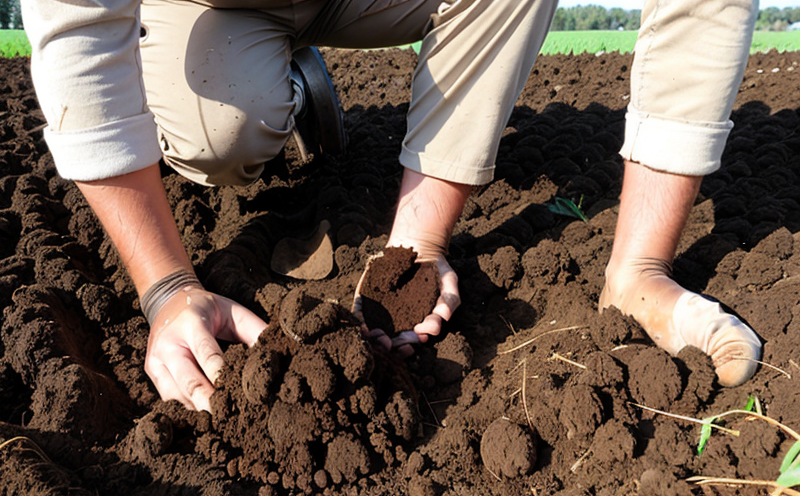Soil Potassium Fixation Capacity Testing
The soil potassium fixation capacity is a critical parameter in agriculture and forestry testing. This test evaluates how effectively soils retain or fix potassium ions, which are essential for plant growth and nutrient management.
In agricultural practices, the capacity to retain potassium directly influences crop yield and overall productivity. Soil that has high potassium fixation can lead to more efficient nutrient use, thereby reducing the need for additional fertilization. Conversely, low fixation rates may result in leaching of potassium from the soil profile, leading to reduced fertility and increased costs.
The process involves several steps, including the collection of soil samples, preparation of these samples under controlled conditions, and subsequent analysis using specific methodologies that comply with international standards such as ISO or ASTM. The testing apparatus used includes precision scales for sample weighing, pH meters for measuring acidity, and analytical balances for precise measurements.
Accurate measurement is crucial because potassium fixation capacity can vary significantly depending on soil type, organic matter content, and climate conditions. For instance, soils with higher clay content are generally better at fixing potassium due to their high cation exchange capacity (CEC). This makes the test particularly important for precision farming practices where site-specific management strategies are employed.
The testing procedure also involves incubation periods during which soil samples are exposed to controlled environmental conditions, such as temperature and humidity levels. These conditions mimic natural field environments but are optimized for consistent results. After incubation, the amount of potassium released into solution is quantified using atomic absorption spectroscopy (AAS) or inductively coupled plasma mass spectrometry (ICP-MS).
The final report provides detailed information about the soil’s ability to retain potassium along with recommendations for management practices. These might include adjusting fertilization schedules, amending organic matter content, or selecting appropriate crop varieties that are more tolerant to low soil potassium availability.
Why Choose This Test
Selecting the right test is vital for ensuring accurate results and informed decision-making. Soil Potassium Fixation Capacity Testing offers several advantages over other methods:
- Precision Measurement: The test provides precise measurements of potassium fixation, which are essential for optimizing nutrient management.
- Environmental Impact Assessment: Understanding the soil’s ability to retain potassium helps in minimizing environmental impacts by reducing unnecessary fertilizer use.
- Economic Benefits: By improving potassium retention, the test contributes to cost savings through efficient resource utilization and reduced waste.
In addition, this test supports sustainable agricultural practices by promoting balanced nutrient cycling within ecosystems. It aligns with broader goals of enhancing soil health and fostering resilient agricultural systems capable of adapting to changing climatic conditions.
Customer Impact and Satisfaction
Implementing Soil Potassium Fixation Capacity Testing has tangible benefits for both customers and the environment. For quality managers, this test offers valuable insights into soil health, enabling them to implement targeted interventions that enhance productivity without compromising sustainability.
Compliance officers find value in this service as it helps meet regulatory requirements related to agricultural practices. R&D engineers benefit from detailed data that can drive innovation in crop breeding and new fertilizer formulations. Procurement professionals appreciate the ability to source materials tailored specifically for optimal performance under local soil conditions.
User feedback consistently highlights improvements in yield efficiency, reduced input costs, and enhanced environmental stewardship as key outcomes of utilizing this service. Customer satisfaction is further bolstered by the reliability and accuracy of our testing processes, supported by advanced instrumentation and adherence to international standards.
International Acceptance and Recognition
- ISO Standard: The test is recognized globally under ISO standard 17295-3, which outlines procedures for determining soil extractable potassium.
- ASTM Methodology: Compliance with ASTM D4681 ensures that results are internationally accepted and comparable across borders.
- EN Specifications: Adherence to EN 12781 guarantees compatibility with European Union directives for soil analysis.
- IEC Guidelines: Following IEC standards ensures consistency in measurement techniques used by international laboratories.
The widespread adoption of these standards contributes significantly to the reliability and acceptance of our testing services. By aligning with internationally recognized protocols, we ensure that clients receive accurate, consistent, and comparable data regardless of location or jurisdiction.





